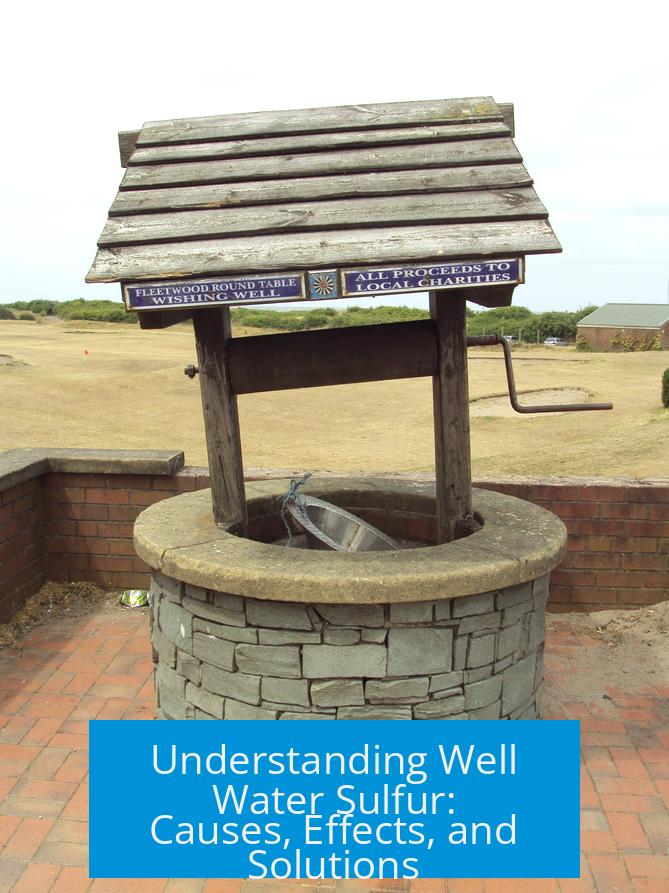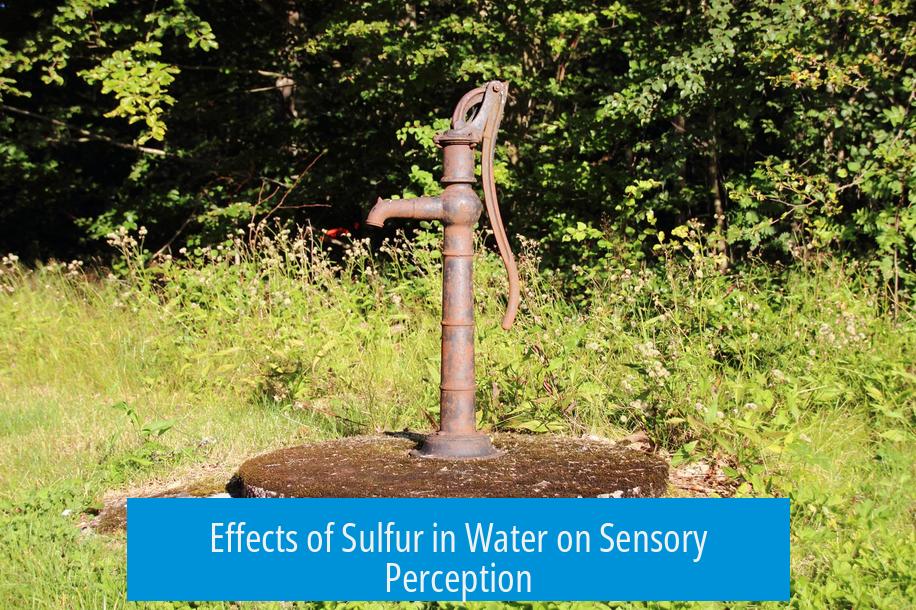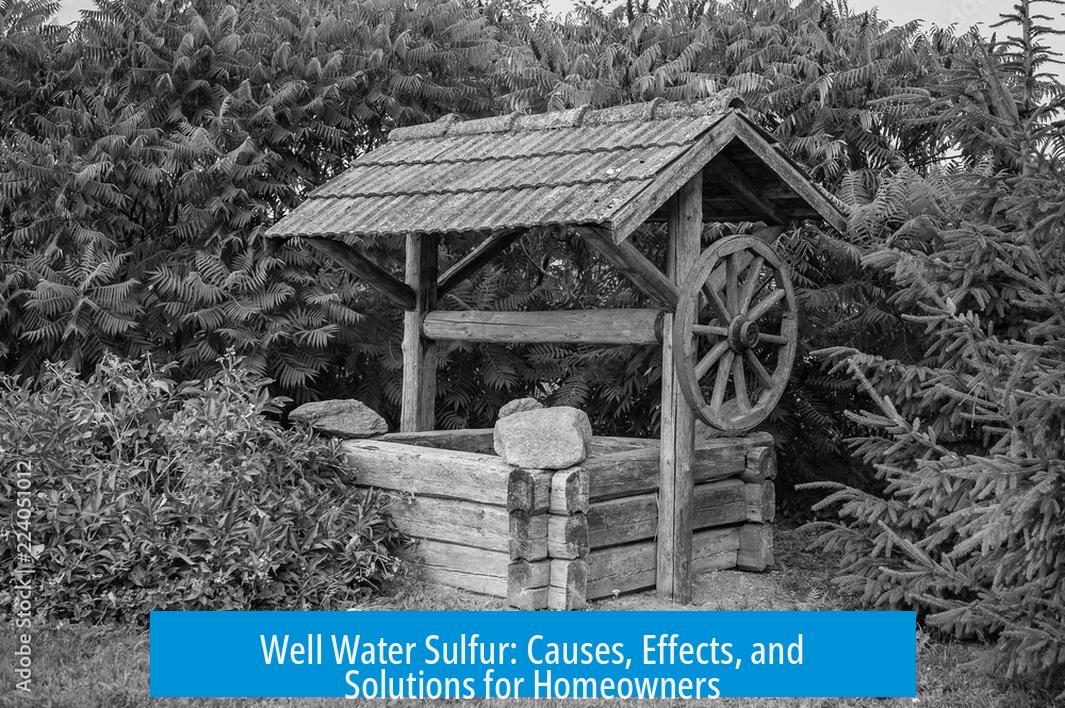Understanding Well Water Sulfur: Causes, Effects, and Solutions

Well water sulfur refers primarily to the presence of hydrogen sulfide (H2S) gas dissolved in groundwater, commonly causing a distinct “rotten egg” smell. It is a widespread occurrence in rural areas and well systems, especially in older homes and farms where groundwater has interacted with sulfur-containing minerals or bacteria. This article explores the occurrence, effects, health concerns, and treatment options related to sulfur in well water.
Occurrence and Commonality of Sulfur in Well Water
Sulfur in well water is frequent in rural locations. Many rural homes, particularly those with private wells, report noticeable sulfur odors.
- Older houses, such as farms or homes built before 1940, often experience sulfur issues due to natural underground conditions.
- Regions with volcanic or sulfur-rich geology—like parts of Hungary or Iceland—commonly have sulfur in their water supplies.
- People worldwide have consumed sulfur-rich water for thousands of years; in Hungary, sulfur water intake dates back over 2,000 years.
The presence is typically linked to natural chemical reactions involving sulfur-bearing minerals and bacterial activity that produce hydrogen sulfide gas.
Cause of the Sulfur Odor in Well Water
Hydrogen sulfide gas, formed when sulfur-reducing bacteria or chemical processes reduce sulfate minerals, dissolves in the groundwater. This gas easily escapes when the water is drawn, creating the characteristic rotten egg smell.
- Sulfur-reducing bacteria consume organic materials and sulfate, releasing H2S as a byproduct.
- Iron sulfide minerals underground can interact with oxygen, promoting hydrogen sulfide formation.
- These odors can sometimes be detected even at very low concentrations, due to the extremely low odor threshold for hydrogen sulfide.
Effects of Sulfur in Water on Sensory Perception

The sulfur smell in well water is highly noticeable and often unpleasant. It can affect drinking water, bathing, and laundry.
- The odor threshold for hydrogen sulfide is very low, allowing humans to detect even trace amounts.
- Bathing or washing clothes in sulfur water may cause a faint sulfur smell on skin or fabrics.
- Heating water, such as when cooking or showering, often volatilizes the hydrogen sulfide, reducing the smell.
- After washing, the sulfur smell usually evaporates quickly, leaving no lasting odor.
Despite the odor, the presence of sulfur does not automatically indicate health risks.
Health and Safety Concerns of Sulfur in Well Water
Sulfur compounds themselves are not considered primary drinking water contaminants, and low levels of hydrogen sulfide are generally not toxic. However, caution is essential.
- The distinctive sulfur smell alone does not mean the water is harmful.
- Problems can arise if sulfur presence stems from bacteria such as sulfur-oxidizing bacteria or coliform bacteria, which may signify contamination.
- Some sulfur bacteria can carry parasites or produce harmful toxins, making the water unsafe to consume without treatment.
- Testing the water quality, especially for microbiological contaminants, is necessary before deeming it safe.
- Natural sulfur spas around the world suggest therapeutic benefits in controlled amounts.
Reliable water testing ensures any health risks are identified and mitigated.
Hair and Skin Impact from Sulfur Water
Continuous exposure to sulfur water can influence skin and hair condition.
- Some individuals report drier hair or skin after bathing in sulfur-rich water.
- Others maintain thick hair despite sulfur content, indicating varied personal responses.
- Washing with sulfur water may cause odor on the skin temporarily but generally does not cause lasting problems.
The effects likely depend on individual skin types and water concentration.
Testing and Treatment for Sulfur in Well Water
Accurate testing of well water is crucial to understand sulfur levels and any associated contaminants.
- Consumers should not rely solely on landlords or previous owners to assert water safety.
- Professional testing kits or certified laboratories can quantify hydrogen sulfide, iron, bacteria, and other impurities.
- Testing guides selection of appropriate treatment systems.
Effective Treatment Options
Treatments vary depending on hydrogen sulfide concentration and source.
| Treatment Method | Description | Application |
|---|---|---|
| Filox Iron Filters | Backwashing filters that remove iron and hydrogen sulfide. | Effective when iron and sulfur co-occur; protects water softeners. |
| Water Softeners | Remove iron minerals, but limited effectiveness on hydrogen sulfide gas. | Not sufficient on their own for sulfur, can get fouled by iron sulfides. |
| Oxidizing Mineral Filters | Convert hydrogen sulfide to sulfate, reducing odor. | Useful on faucets or local points for drinking water. |
| Whole House Hydrogen Peroxide Systems | Oxidize and remove sulfur compounds through injection systems. | Expensive, suited for severe sulfur issues. |
| UV Light Disinfection | Eliminates bacterial contaminants related to sulfur odors. | Used post softening to ensure microbial safety. |
| Reverse Osmosis (RO) Systems | Removes dissolved contaminants and improves taste. | Installed for drinking water with remineralization for taste. |
| PUR or Similar Faucet Filters | Convenient, domestic filters reducing sulfur smell in drinking water. | Economical for odor control on tap water. |
Technical Chemistry of Sulfur in Well Water
Sulfur presence in groundwater involves chemical and biological processes:
- Iron sulfide minerals undergo oxidation reactions producing hydrogen sulfide gas.
- Hydrogen sulfide is soluble in water but volatilizes quickly when exposed to air or heat.
- Ions such as sulfate may also be present, formed by oxidation of sulfide.
- Bacteria can metabolize sulfur compounds, adding complexity to contamination.
Understanding these processes helps in designing appropriate treatment and prevention strategies.
Practical and Social Notes on Sulfur Water
Users of sulfur-rich well water often notice some lifestyle effects:
- Persons consuming sulfur water may temporarily emit a mild sulfur odor.
- Some metals, especially silver jewelry, may tarnish and blacken when exposed.
- After washing or bathing, the smell dissipates rapidly, avoiding long-term inconvenience.
- In places like Iceland, locals educate visitors that sulfur smells originate from natural volcanic sources and are harmless.
Key Takeaways
- Hydrogen sulfide in well water causes a strong sulfur smell common in rural and older homes.
- The odor is detectable at very low H2S levels and often harmless unless caused by harmful bacteria.
- Health risks depend on bacterial contamination and other pollutants, not sulfur itself.
- Water testing is essential to assess sulfur concentration and microbial safety.
- Filox iron filters, oxidizing filters, UV lights, and RO systems effectively treat sulfur problems.
- Water softeners alone are insufficient and can suffer damage from iron sulfides.
- Sulfur water may cause temporary odor on skin or clothes and can tarnish silver items.
- Proper treatment ensures safe, odor-free water for drinking, bathing, and household use.
What causes the sulfur smell in well water?
The smell comes from hydrogen sulfide gas, which forms when iron sulfide minerals interact with oxygen. This gas is common in rural well water and has a strong rotten egg odor even at very low levels.
Is sulfur in well water harmful to health?
Pure sulfur is not usually harmful. However, if sulfur bacteria or coliform bacteria are present, the water can be unsafe. Testing is essential to rule out harmful microbes.
How can I remove sulfur smell and taste from my well water?
Special filters like a backwashing Filox iron filter can remove hydrogen sulfide. Water softeners alone do not remove it effectively. UV treatment plus reverse osmosis systems help ensure safe drinking water.
Can sulfur in water affect my hair and skin?
Sulfur may dry hair or cause breakage for some. Others report no problems. Effects vary by individual and water concentration.
Why does sulfur water make my clothes and skin smell?
Hydrogen sulfide gas clings to skin and fabrics, creating a noticeable odor. The smell usually evaporates quickly after drying or heating.
Is it true that sulfur water can discolor silver jewelry?
Yes, sulfur gases can tarnish silver by reacting with it. This is common in places with sulfur-rich water like volcanic regions.





Leave a Comment